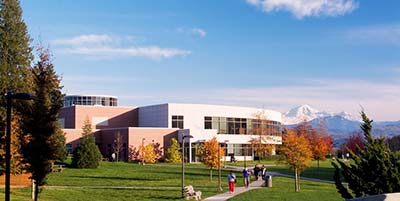“This can’t be happening” was a sentence often repeated during the recent presidential campaign in the United States. However, it happened and Trump is already the 45th president of the U.S. In a context of uncertainty, the UFV Politalk Roundtable held a discussion on January 26 entitled “Trump as President: What Now?” to help understand a part of this puzzle.
The puzzle is so complex that even the experts could not be sure of the future.
“I think that Trump’s victory says that anything is possible, because all the way along the course many people said it would never happen, but it happened. In political science we are not real scientists, we can’t predict anything,” said Fiona MacDonald, professor in the political sciences department.
“It is too soon to know why what happened happened, and it is too soon to know what will happen,” said geography professor Michelle Rhodes. She suggested that most of the decisions which affect the daily lives of citizens are made locally, and the Republican Party will not support all of Trump’s decisions.
“There were a lot of voices critical inside the Republican Party. This is a challenge,” she said. “The Republicans need to know where they are. They are trying to figure out what path Trump is going to take.”
The success of Trump has been linked to the social and economical constraints. The messages projected during the campaign have been a mirror for nostalgia, one of the most powerful “weapons” he could use.
“With the nostalgic promise to ‘make America great again,’ Trump tapped into a deep national longing for ‘the American Dream,’ a utopian ethos which is one of the most significant ideals of the American nation. Trump’s campaign slogan intersected and resonated against the real experience of Americans who had been socioeconomically left behind,” explained Nicola Mooney, professor in the department of social, cultural, and media studies.
However, his approach to this nostalgic past also has negative connotations, creating a dystopian reality for some.
“Depending on the era one idealizes, a great many social exclusions and inequities are in play — for instance, gay rights, civil rights, women’s rights,” said Mooney. “This was deeply unsettling to many Americans for whom the past is not utopian but dystopian: unequal, oppressive, violent.”
The electoral race was a field where language violence played a crucial role.
“During the campaign, there has been cultural violence based on language. ‘Crooked Hillary’ or saying that foreigners have stolen our jobs are examples of this violence,” said peace and conflict studies professor Steven Schroeder.
Women’s rights and the fact that Donald Trump has been considered by some as the ultimate expression of toxic masculinity are one of the main social concerns, according to MacDonald. “We need to start engaging with this topic. Many men are already doing that in their daily life and their relationships.”
Immigrants have been in his spotlight and the building of the Mexican wall crystallizes Trump’s aspirations. However, experts point out that its construction is unviable.
“There is a gap between signing an order and translating it into reality. Trump says it will cost $8 billion, but experts say that [it could be] from 15 to 35,” said Stephen Piper, professor in the social, cultural, and media studies department.
According to Piper, the wall is to build on the fear of Americans.
“In this context, the answer was blaming Muslims and Mexicans. They felt they threatened their jobs,” he said. “This is going to be a wall with a lot of holes in it. It will bring back the popular hopes but it won’t bring back their jobs or the American Dream.”
The map of international relations of the United States is being reshaped with increasing tensions in different places. According to history professor Scott Sheffield, the main focuses are in Palestine, China and Taiwan, Europe, and Russia.
“In Europe, he wants the destabilization and disintegration of the euro,” he said. “He was inciting the Brexit and he has been very critical of voices such as Angela Merkel, and supporting Marine Le Pen.”
In this context, Canada has the opportunity to draw a pacific impact worldwide.
“Canada used to mirror in the U.S., like a brother in the south. This is a good opportunity to awaken. We can make a positive contribution to international relations, be peace builders,” concluded Schroder.


